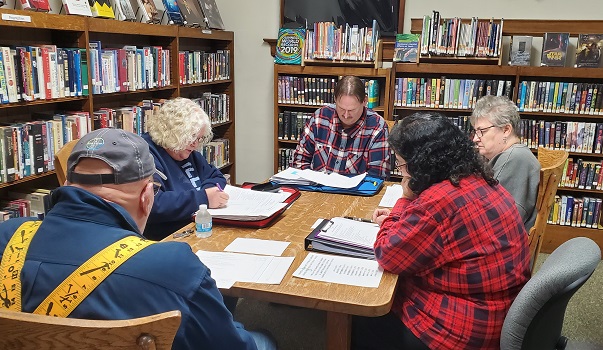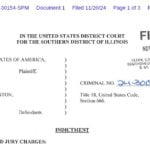Onarga, IL. (ECWd) –
During the December 16, 2019, Onarga Public Library District’s Board of Trustees meeting, the Board voted to go into closed session to discuss pay raises for all of their employees.
After closed session, we were invited back in to the meeting, where they Motioned and voted to adjourn the meeting.
I asked about the pay raises, if any raises were given, and when the vote took place.
The Board said they gave out pay raises and voted on the raises in closed session.
I informed them it is illegal to vote on anything in closed session and the pay raises were not legal at this time and asked them to place that item on the January meeting agenda.
There was no commitment by the Board to place pay raises on the next agenda (which means any alleged pay raises are currently invalid).
When the Board first tried entering closed session, they did it improperly and got upset when I told them I did not hear any motion or vote to enter closed session (it was later done properly):
<span style="font-family: Courier New; font-size: small;">(5 ILCS 120/2a)</span> <span style="font-family: Courier New; font-size: small;">(from Ch. 102, par. 42a)</span> <span style="font-family: Courier New; font-size: small;">Sec. 2a. </span><span style="font-family: Courier New; font-size: small;">A public body may hold a meeting closed to the public, or close a portion of a meeting to the public, <span style="text-decoration: underline;"><strong>upon a majority vote of a quorum present</strong></span>, taken at a meeting open to the public for which notice has been given as required by this Act. A single vote may be taken with respect to a series of meetings, a portion or portions of which are proposed to be closed to the public, provided each meeting in such series involves the same particular matters and is scheduled to be held within no more than 3 months of the vote. <span style="text-decoration: underline;"><strong>The vote of each member on the question of holding a meeting closed to the public and a citation to the specific exception contained in Section 2 of this Act which authorizes the closing of the meeting to the public shall be publicly disclosed at the time of the vote and shall be recorded and entered into the minutes of the meeting</strong></span>. Nothing in this Section or this Act shall be construed to require that any meeting be closed to the public.</span>
Sec. 2a. A public body may hold a meeting closed to the public, or close a portion of a meeting to the public, upon a majority vote of a quorum present, taken at a meeting open to the public for which notice has been given as required by this Act. A single vote may be taken with respect to a series of meetings, a portion or portions of which are proposed to be closed to the public, provided each meeting in such series involves the same particular matters and is scheduled to be held within no more than 3 months of the vote. The vote of each member on the question of holding a meeting closed to the public and a citation to the specific exception contained in Section 2 of this Act which authorizes the closing of the meeting to the public shall be publicly disclosed at the time of the vote and shall be recorded and entered into the minutes of the meeting. Nothing in this Section or this Act shall be construed to require that any meeting be closed to the public.
The Open Meetings Act prohibits voting, or taking action, on items in closed sessions – all votes/action must be made in public:
(c) The court, having due regard for orderly administration and the public interest, as well as for the interests of the parties, may grant such relief as it deems appropriate, . . . [including] declaring null and void any final action taken at a closed meeting in violation of this Act
One final issue: the Board went into closed session to discuss compensation of “all” of its employees, which is another alleged violation. The exceptions (Section 2(c)(1) and (2)) to discussing compensation is for “specific” employees (not for an across-the-board- raise for all employees) or “specific classes” of employees.
This Library has a history of violations of law (read them here), and must be held accountable to its actions. We will see that this issue is corrected.









3 Comments
Sal Tessio
Posted at 17:21h, 18 DecemberI think local library boards are yet another example of there being too many units of government in Illinois. All of these little boards were originally created for the primary reason of providing jobs for loyal partisan cronies. Their time has long passed. Illinois has more units of government than any other state. Educate, consolidate, eliminate.
Doris Hubner
Posted at 17:18h, 17 DecemberBoy, that is well said. This library board wants to make their own rules and no amount of effort seems to change anything. I recently was involved in trying to get them to post the agenda on the front door so the public could see it—the chairman is quoted as telling the Watch Dogs that he hasn’t posted one in 17 years! The Illinois Attorney General’s office did not fine them, however, “strongly recommended” they post it lower for the public to see. So, it went from being posted at the top left corner of the door and you had to be over 6 feet to read it….now, a 3-4′ person can read it straight on as it is placed under the door handle, but I’d rather stoop down to read as opposed to carrying a ladder to see it. I fought the board for many, many months and instead of doing their job as a board, they let the librarian make nasty remarks and ultimately made the decision to do nothing. Thank you so much! Doris
c.a. schenk
Posted at 10:17h, 17 DecemberUnfortunaly Libraries accross the State are acting improperly and the voters dont care. In addition Board memebers are not held acoutable to the voters.